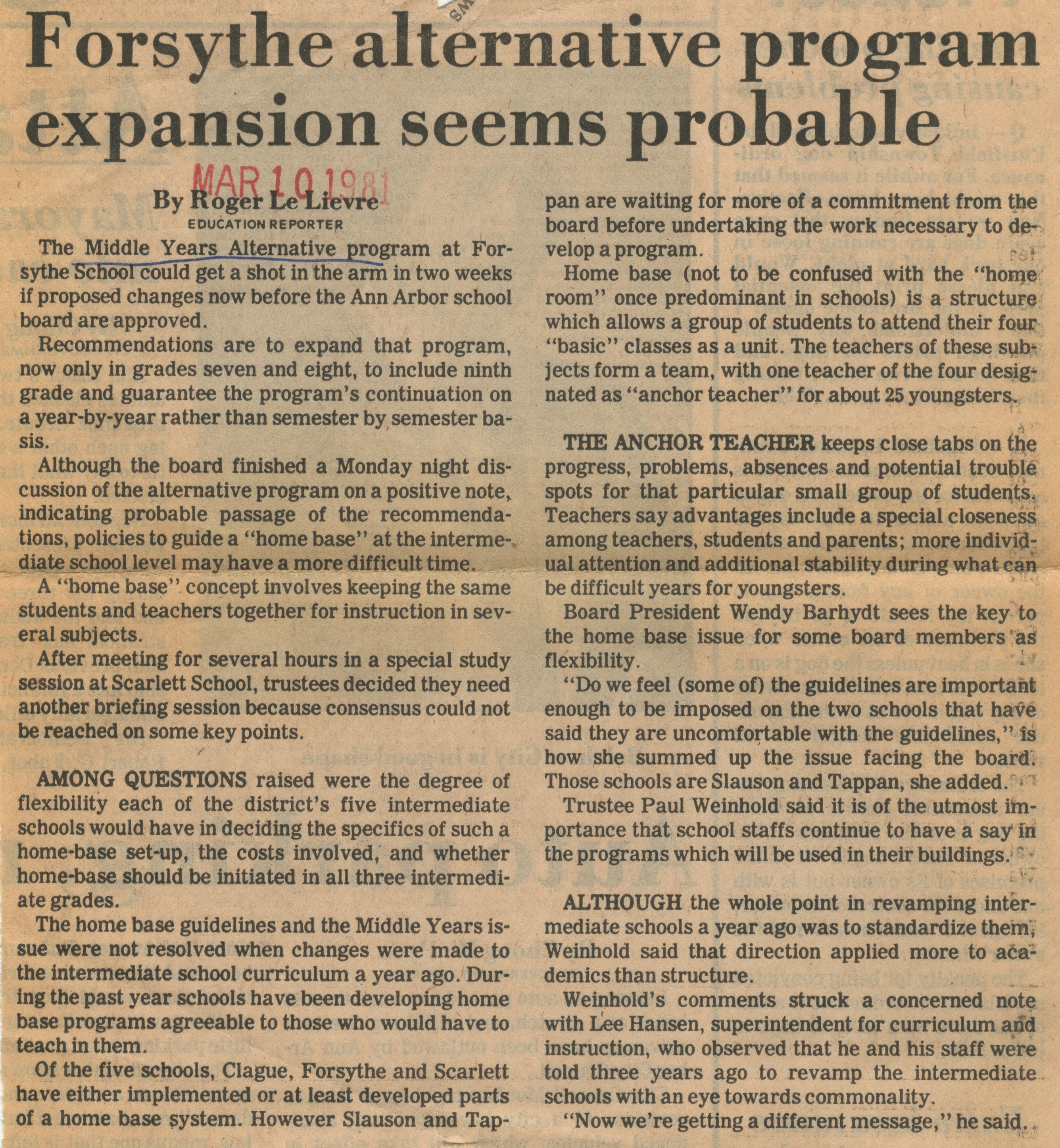Forsythe Alternative Program Expansion Seems Probable

Forsythe alternative program expansion seems probable
By Roger Le Lievre
EDUCATION REPORTER
The Middle Years Alternative program at Forsythe School could get a shot in the arm in two weeks if proposed changes now before the Ann Arbor school board are approved.
Recommendations are to expand that program, now only in grades seven and eight, to include ninth grade and guarantee the program’s continuation on a year-by-year rather than semester by semester basis.
Although the board finished a Monday night discussion of the alternative program on a positive note, indicating probable passage of the recommendations, policies to guide a “home base” at the intermediate school level may have a more difficult time.
A “home base” concept involves keeping the same students and teachers together for instruction in several subjects.
After meeting for several hours in a special study session at Scarlett School, trustees decided they need another briefing session because consensus could not be reached on some key points.
AMONG QUESTIONS raised were the degree of flexibility each of the district’s five intermediate schools would have in deciding the specifics of such a home-base set-up, the costs involved, and whether home-base should be initiated in all three intermediate grades.
The home base guidelines and the Middle Years issue were not resolved when changes were made to the intermediate school curriculum a year ago. During the past year schools have been developing home base programs agreeable to those who would have to teach in them.
Of the five schools, Clague, Forsythe and Scarlett have either implemented or at least developed parts of a home base system. However Slauson and Tappan are waiting for more of a commitment from the board before undertaking the work necessary to develop a program.
Home base (not to be confused with the “home room” once predominant in schools) is a structure which allows a group of students to attend their four “basic” classes as a unit. The teachers of these subjects form a team, with one teacher of the four designated as “anchor teacher” for about 25 youngsters.
THE ANCHOR TEACHER keeps close tabs on the progress, problems, absences and potential trouble spots for that particular small group of students. Teachers say advantages include a special closeness among teachers, students and parents; more individual attention and additional stability during what can be difficult years for youngsters.
Board President Wendy Barhydt sees the key to the home base issue for some board members as flexibility.
“Do we feel (some of) the guidelines are important enough to be imposed on the two schools that have said they are uncomfortable with the guidelines,” is how she summed up the issue facing the board. Those schools are Slauson and Tappan, she added.
Trustee Paul Weinhold said it is of the utmost importance that school staffs continue to have a say In the programs which will be used in their buildings.
ALTHOUGH the whole point in revamping intermediate schools a year ago was to standardize them, Weinhold said that direction applied more to academics than structure.
Weinhold’s comments struck a concerned note with Lee Hansen, superintendent for curriculum and instruction, who observed that he and his staff were told three years ago to revamp the intermediate schools with an eye towards commonality.
“Now we’re getting a different message,” he said.
Article
Subjects
Roger Le Lievre
Alternative Education
Ann Arbor Board of Education
Ann Arbor Public Schools
Education
Forsythe Intermediate School
Middle Years Alternative Program (MYA)
Clague Middle School
Scarlett Middle School
Herbert M. Slauson School
Tappan Middle School
Ann Arbor Public Schools - Curriculum
Old News
Ann Arbor News
Wendy Barhydt
Lee Hansen